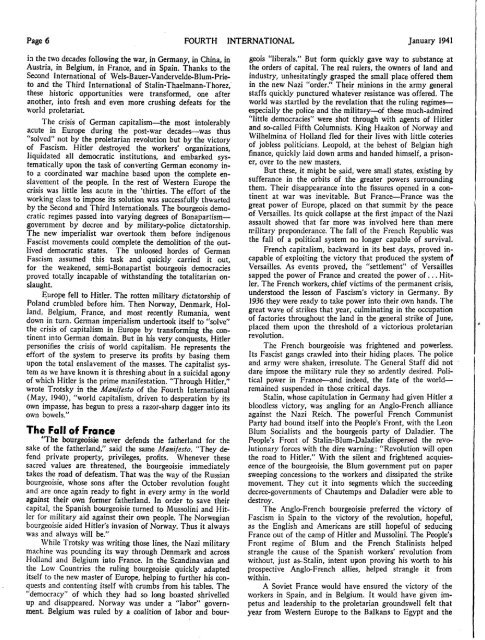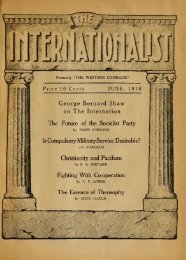January 1941 - Marxists Internet Archive
January 1941 - Marxists Internet Archive
January 1941 - Marxists Internet Archive
Create successful ePaper yourself
Turn your PDF publications into a flip-book with our unique Google optimized e-Paper software.
Page 6 FOURTH INTERNATIONAL <strong>January</strong> <strong>1941</strong><br />
b the two decades following the war, in Germany, in China, in<br />
Austria, in Belgium, in France, and in Spain. Thanks to the<br />
Second International of Wels-Bauer-Vandervelde-Blum-Prieto<br />
and the Third International of Stalin-Thaelmann-Thorez,<br />
these historic opportunities were transformed, one after<br />
another, into fresh and even more crushing defeats for the<br />
world proletariat.<br />
The crisis of German capitalism-the most intolerably<br />
acute in Europe during the post-war decades-was thus<br />
"solved" not by the proletarian revolution but by the victory<br />
of Fascism. Hitler destroyed the workers' organizations,<br />
liquidated all democratic institutions, and embarked systematically<br />
upon the task of converting German economy into<br />
a coordinated war machine based upon the complete enslavement<br />
of the people. In the rest of Western Europe the<br />
crisis was little less acute in the 'thirties. The effort of the<br />
working class to impose its solution was successfully thwarted<br />
by the Second and Third Internationals. The bourgeois democratic<br />
regimes passed into varying degrees of Bonapartismgovernment<br />
by decree and by military-police dictatorship.<br />
The new imperialist war overtook them before indigenous<br />
Fascist movements could complete the demolition of the outlived<br />
democratic states. The unloosed hordes of German<br />
Fascism assumed this task and quickly carried it out,<br />
for the weakened, semi-Bonapartist bourgeois democracies<br />
proved totally incapable of withstanding the totalitarian onslaught.<br />
~urope fell to Hitler. The rotten military dictatorship of<br />
Poland crumbled before him. Then Norway, Denmark, HoIland,<br />
Belgium, France, and most recently Rumania, went<br />
down in turn. German imperialism undertook itself to "solve"<br />
the crisis of capitalism in Europe by transforming the continent<br />
into German domain. But in his very conquests, Hitler<br />
personifies the crisis of world capitalism. He represents the<br />
effort of the system to preserve its profits by basing them<br />
upon the total enslavement of the masses. The capitalist system<br />
as we have known it is threshing about in a suicidal agony<br />
of which Hitler is the prime manifestation. "Through Hitler,"<br />
wrote Trotsky in the Manifesto of the Fourth International<br />
(May, 1940), "world capitalism, driven to desperation by its<br />
own impasse, has begun to press a razor-sharp dagger into its<br />
own bowels."<br />
The Fall of France<br />
liThe bourgeoisie never defends the fatherland for the<br />
sake of the fatherland," said the same Manifesto. "They defend<br />
private property, privileges, profits. Whenever these<br />
sacred values are threatened, the bourgeoisie immediately<br />
takes the road of defeatism. That was the way of the Russian<br />
bourgeoisie, whose sons after the October revolution fought<br />
and are once again ready to fight in every army in the world<br />
against their own fonner fatherland. In order to save their<br />
capital, the Spanish bourgeoisie turned to Mussolini and Hitler<br />
for military aid against their own people. The Norwegian<br />
bourgeoisie aided Hitler's invasion of Norway. Thus it always<br />
was and always will be."<br />
While Trotsky was writing those lines, the Nazi military<br />
machine was pounding its way through Denmark and across<br />
Holland and Belgium illto France. In the Scandinavian and<br />
the Low Countries the ruling bourgeoisie quickly adapted<br />
itself to the new master of Europe, helping to further his conquests<br />
and contenting itself with crumbs from his tables. The<br />
"democracy" of which they had so long boasted shrivelled<br />
up and disappeared. Norway was under a "labor" government.<br />
Belgium was ruled by a coalition of labor and bourgeois<br />
"liberals." But form quickly gave way to substance at<br />
the orders of capital. The real rulers, the owners of land and<br />
industry, unhesitatingly grasped the small place offered them<br />
in the new Nazi "order." Their minions in the army general<br />
staffs quickly punctured whatever resistance was offered. The<br />
world was startled by the revelation that the ruling regimesespecially<br />
the police and the military-of these much-admired<br />
"little democracies" were shot through with agents of Hitler<br />
and so-called Fifth Columnists. King Haakon of Norway and<br />
Wilhelmina of Holland fled for their lives with little coteries<br />
of jobless politicians. Leopold, at the behest of Belgian high<br />
finance, quickly laid down arms and handed himself, a prisoner,<br />
over to the new masters.<br />
But these, it might be said, were small states, existing by<br />
sufferance in the orbits of the greater powers surrounding<br />
them. Their disappearance into the fissures opened in a continent<br />
at war was inevitable. But France-France was the<br />
great power of Europe, placed on that summit by the peace<br />
of V~rsailles. Its quick collapse at the first impact of the Nazi<br />
assault showed that far more was involved here than mere<br />
Ir.ilitary preponderance. The fall of the French Republic was<br />
the fall of a political system no longer capable of survival.<br />
French capitalism, backward in its best days, proved incapable<br />
of exploiting the victory that produced the system of<br />
Versailles. As events proved, the "settlement" of Versailles<br />
sapped the power of France and created the power of ... H itler.<br />
The French workers, chief victims of the permanent crisis,<br />
understood the lesson of Fascism's victory in Germany. By<br />
1936 they were ready to take power into their own hands. The<br />
great wave of strikes that year, culminating in the occupation<br />
of factories throughout the land in the general strike of June,<br />
placed them upon the threshold of a victorious proletarian<br />
revolution.<br />
The French bourgeoisie was frightened and powerless.<br />
I ts Fascist gangs crawled into their hiding places. The police<br />
and army were shaken, irresolute. The General Staff did not<br />
dare impose the military rule they so ardently desired. Political<br />
power in France-and indeed, the fate of the worldremained<br />
suspended in those critical days.<br />
Stalin, whose capitulation in Germany had given H itIer a<br />
bloodless victory, was angling for an Anglo-French alliance<br />
against the Nazi Reich. The powerful French Communist<br />
Party had bound itself into the People's Front, with the Leon<br />
Blum Socialists and the bourgeois party of Daladier. The<br />
People's Front of Stalin-Blum-Daladier dispersed the revolutionary<br />
forces with the dire warning: "Revolution will open<br />
the road to Hitler." With the silent and frightened acquieseence<br />
of the bourgeoisie, the Blum government put on paper<br />
sweeping concessions to the workers and dissipated the strike<br />
movement. They cut it into segments which the succeeding<br />
decree-governments of Chautemps and Daladier were able to<br />
destroy.<br />
The Anglo-French bourgeoisie preferred the victory of<br />
Fascism in Spain to the victory of the revolution, hopeful;<br />
as the English and Americans are still hopeful of seducing<br />
France out of the camp of Hitler and Mussolini. The People's<br />
Front regime of Blum and the French Stalinists helped<br />
strangle the cause of the Spanish workers' revolution from<br />
without, just as·.Stalin, intent upon proving his worth to his<br />
prospective Anglo-French allies, helped strangle it from<br />
within.<br />
A Soviet France would have ensured the victory of the<br />
workers in Spain, and in Belgium. It would have given impetus<br />
and leadership to the proletarian groundswell felt that<br />
year from Western Europe to the Balkans to Egypt and the
















